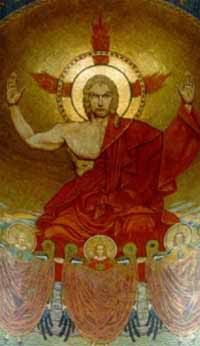What an ecumenical meeting sounds like..

Guess which "tradition" needs to change
Cardinal Walter Kasper, the Vatican’s top ecumenical official, lined up during the distribution of Communion to receive a blessing from Anglican Bishop N.T. Wright.
The exchange was hardly revolutionary, since it is standard practice in Anglican-Roman Catholic dialogues; and, truth be told, after a few moments of patience as the Communion line stalled, Kasper “pulled rank” and moved directly to Wright for his blessing.
Nevertheless, the fraternal symbolism packed drama, especially in light of the crisis in Anglican-Catholic relations over the ordination of an openly gay Episcopal bishop in the United States and the approval of a rite for blessing same-sex unions by an Anglican province in Canada.
Wright later said it will be a “treasured memory.”
In the same spirit, Catholic Bishop Kevin Dunn of Hexham and Newcastle, England, invited Wright to preach the homily at a Jan. 14 Catholic Mass, and prayed with Wright before the distribution of Communion.
Dominican Fr. Fergus Kerr, editor of the noted theological journal New Blackfriars, flatly asserted that the Catholic church is so badly divided that “we can’t risk much more ecumenical reception at the present time.”
“I am deeply convinced that the big issue upon which the future of the church depends is collegiality,” Jesuit Fr. Ladislas Örsy of Georgetown University said at one point. “It’s the only way to break through this excessive centralization.” Dominican Sr. Geraldine Smyth of the Irish School of Ecumenics warned of a trend towards a “hardened canopy of identity.”
Several participants expressed dissatisfaction, and even personal pain, over the inability of Catholics and Protestants to share the Eucharist. John Wilkins, former editor of The Tablet, called it “intolerable.”
Others complained about what they saw as abuses of ecclesiastical authority. “Catholics have beautiful language about the church, but there’s a gap between the rhetoric and reality,” Connolly said, citing the sexual abuse crisis in particular.
Many participants argued that ecumenical progress is dependent upon Catholic reforms, especially concerning the Vatican and the papacy.
Jesuit Fr. Thomas Reese, former editor of America magazine, said that the Catholic church needs ecumenism in order to reform itself, since it’s often easier for Protestants to talk to the Vatican than for some Catholic theologians.
This invitation-only gathering of 140 Catholics, Anglicans, Methodists, Orthodox and a handful of representatives of other traditions sought to answer these challenges.
Boy, I hate the word "tradition". It makes as much sense as calling
folks
living their 2,000 year Faith being called "traditionalists". It makes
minimal
Catholic's Scripture and Tradition. And sounds like the tradition of
cranberry
sauce at Thanksgiving dinner.
But really, is there
anything the Anglicans, Methodists, Orthodox
and handful of representatives
of other traditions, are expected to do? It
would seem ecumenical means only
Catholic change.
The whole ecumenical world is waiting for the
Catholics to catch up with
them. I don't think that's how it will
work:
"We must achieve full unity of the Church and reconciliation
among
Christians, even at the cost of submitting our own will to the will of
the
Lord," the Pope said.
Everyone, not just the Catholics,
participants in Ecumenical
martyrdom




2 Comments:
You wrote "It would seem ecumenical means only Catholic(s) change." I'm 58, I've been a Catholic for 25 yrs and I've seen it over and over. Dialog means talking and talking until the Curch gives in to the protestants, the Jews or the infidels!
BTW, thanks for reading The New Crusade!
Post a Comment
<< Home